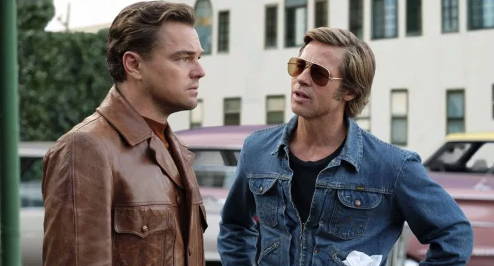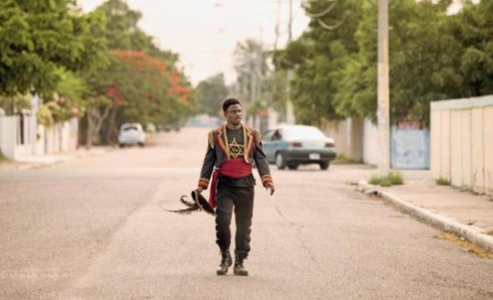Once Upon a Time In Hollywood

Cast: Leonardo DiCaprio, Brad Pitt, Margot Robbie, Al Pacino, Kurt Russell, Dakota Fanning, Bruce Dern, Luke Perry, Damon Herriman
Director: Quentin Tarantino
161 mins
Ever since 1992, when he made his feature debut with Reservoir Dogs, Quentin Tarantino has been one of his generation's most talked-about, unique and fascinating directors. Combining his distinct sensibilities with his pure and at times unbridled love for cinema, Tarantino has always found a way to entertain his audience, regardless of which genre he's tackling. With his ninth, Once Upon a Time in Hollywood, Tarantino paints a loving homage to a bygone era with a period piece that takes viewers back to 1960s California. Bolstered by strong performances and immersive production design, this is quite an introspective and rewarding film from Tarantino. What sets Once Upon a Time in Hollywood apart from Tarantino's recent fare like Django Unchained is its lack of a singular through-line that thrusts the story forward. Rather than be plot-driven with a traditional narrative, Once Upon a Time in Hollywood acts more like a snapshot of a specific time period, taking viewers along for the ride as they follow the characters such as fading television star Rick Dalton (Leonardo DiCaprio) and his loyal stunt man Cliff Booth (Brad Pitt) through their daily lives. For a majority of its running time, Once Upon a Time in Hollywood is quite restrained for a Tarantino picture, deliberately taking its time to establish the characters and environment in ways that slowly draw the viewer into its world. Granted, there are still plenty of famous Tarantino trademarks throughout the script, but this plays as a relatively refreshing change-of-pace for the auteur.
There are times though, where the film feels its length due to Tarantino's approach, but largely, it's still effective. One of the primary reasons is because the characters are so enjoyable to watch. Rick and Cliff are the emotional core of the film, with DiCaprio and Pitt displaying an inherent sweetness in their characters' relationship. They genuinely come across as two old friends who have been through a lot. Unsurprisingly, both actors (who have worked with Tarantino before) are in top form here, whether they're carrying stretches of the film alone on their shoulders or playing off each other with terrific rapport. As the emotionally insecure Rick, DiCaprio gets an opportunity to showcase a different side of his range in ways that can be humorous and heartfelt. Pitt fits the part of Cliff like a glove, channelling the no-nonsense and easy-going sides of the stunt man's personality, depending on what the scene calls for. The two are always entertaining on-screen and make a great pair. Once Upon a Time in Hollywood made headlines for putting together one of Tarantino's most star-studded ensembles, but the majority of these roles are cameo in length by comparison. The likes of Al Pacino, Kurt Russell, Mike Moh, Dakota Fanning, and Luke Perry (among many others) are only on-screen for a scene or two, but they still manage to make the most of their minimal screen time. The most substantial supporting part is that of Sharon Tate (Margot Robbie), who lives next door to Rick with her husband, Roman Polanski. Admittedly, this is hardly the meatiest role Robbie's had in her career to date, but she too maximises what she's given to work with and finds ways to endear herself to the audience. Even though Sharon's storyline is largely disconnected from what's going on with Rick and Cliff, the cutaways to her life are still interesting and don't drag the film down.
Another great asset Once Upon a Time in Hollywood has at its disposal is Tarantino's tremendous crew, that works diligently to recreate 1960s Los Angeles in intricate detail. Whether it's the City of Angels itself or the TV sets Rick is shooting on, the film is successful in its mission to transport viewers back in time as they work together to craft something immensely alluring, grabbing hold of the viewer and never letting go until the credits roll. And unsurprisingly, Tarantino's soundtrack selections help set the mood for the scenes in ways only he can pull off. All in all, Once Upon a Time in Hollywood is a different beast from Tarantino, but very much the product of his unique vision. It's nice to see the director tone down the usual "Tarantinoisms" that have become well-known throughout his career, calling upon them only at opportune times to enhance their impact. In some respects, Once Upon a Time in Hollywood isn't as accessible to general audiences as something like Inglourious Basterds or Django Unchained were, but it's still worth checking out on the big screen.

Whenever a screaming match begins about the ethics and political correctness of satirising charged topics or issues, the conversation is almost always derailed the moment it is framed around sensitivity, or the lack thereof, instead of responsibility. By rooting this dialogue in a question of feelings, rather than real world implications, pundits, and those who take their bait, dilute the potential impact of satire, obfuscating its power and stakes so that it becomes as relevant as a dirty joke uttered by a teenager over the dinner table. Chris Morris’ first feature in nine years The Day Shall Come, follows the escapades of Moses Al Shabaz (Marchánt Davis), a radical Miami preacher who advocates for “Black Jihad,” the parameters of which are never actually explained. Even though his organisation, the Star of Six Farm, has only four members and doesn’t seem to do anything besides farm, the FBI decides to lay a trap for him by baiting him into accepting money and weapons from men on the FBI’s payroll who are posing as Islamist terrorists. These men - Reza Mohamed Pahlavi (Kayvan Novak) and Nur Al Din (Pej Vahdat) are, of course, not even given the dignity of a nationality, even though they have thick Iranian accents. The former’s name is even a simple shuffle of the last shah’s name. He is also a paedophile, a fact that is mined for too many attemped jokes, including a scene where he is on a date with a noticeably younger girl. This is supposed to be hilarious. On the FBI side, we mostly follow Kendra, (Anna Kendrick), a feisty young agent who, in between sabotaging the lives of black and brown people, calls out her co-workers for their chauvinism.
The film claims that its events are based on hundreds of true stories, which is not a stretch given the horrific, and well-documented, history of U.S. espionage conducted by the FBI, amongst other American law-enforcement agencies. But that only makes matters worse. Given the countless black organisations that have been targeted, infiltrated, and sabotaged by the FBI, Morris’ decision to portray the Star of Six Farm as a dim-witted ignorant group of people who abandon their most fundamental principles at the first chance they get to make money, speaks volumes to his grotesque view of radical black organising. With little more than vague proclamations, the group seems to be a mishmash of notable historical black organisations, most obviously the Nation of Islam and the Black Panthers. But unlike these actual groups, the Star of Six Farm doesn’t seem to have any kind of coherent ideology or set of goals. They wax poetically about a brighter future, but don’t seem to do anything that could possibly get them closer to that. Even worse, Moses’s motivations are never fully clear.
At times, it seems as though his heart is in the right place, but his mind is incapable of making a right decision, in others he is a borderline conman, and a pathological liar. Either way, the film never wastes an opportunity to portray him as an idiot. There’s a scene early on where his landlord tries to evict him because he is in rent arrears with the property, and he proposes to pay him back in potatoes he had just acquired, only to realise that he had been sold a bag of wooden blocks. Any kind of sympathy extended towards him or the other members of the group thus becomes inherently condescending, their story becomes a comedy of errors, instead of an allegory for the tragedy that is the orchestrated demise of black activism and organising in America. It would have been logistically impossible to confirm whether or not there were ever such small-scale groups whose stories were as absurd as this, but that doesn’t matter.
At best, Morris and co-writer Jesse Armstrong didn’t do their homework, at worse, they poured over the rich and vast history of black radical thought, activism and organising in America, only to reduce it to a joke, to a delusional, possibly mentally ill, man who rides a horse around Miami dressed in a shower curtain. This is, of course, not to mention the monstrosity that is Kendrick's character of Kendra. She is, simply put, the most vile kind of white woman imaginable, she who would call her co-workers sexist as she diligently plans the ruin of black and brown communities. The film by no means exonerates her, but it doesn’t give her half the condemnation she deserves either. In fact, the film goes out of its way to emphasise her mixed feelings about the whole ordeal. We get countless, excruciating close-ups and medium shots of her huffing and puffing at the messiness of the whole affair, even as she pushes all the buttons that ensure it happens.
Morris would like you to know that this woman, whose job is to lure black and brown people to crime so that they may be incarcerated for the benefit of the state and its propaganda machine, has a conscience. Why does that remotely matter? It, of course, doesn’t. And neither do any of this film’s shallow “insights”. So the question becomes: what is the point of the satire here? Why subject an audience to ninety minutes of black people being duped and terrorised by snarky and smirky FBI agents, only for the latter to have the happy ending? Why portray this group of “radical” black organisers as so debased, so detached from the most fundamental tenets of decency, that they’re willing to sell weapons to a white supremacist group, Nazi/Confederate paraphernalia and all, just for money? Your guess is as good as mine. Morris simply doesn’t seem to have anything interesting to say with this material. The closest he gets to any kind of coherent statement is: “FBI bad,” but that should not come as a surprise to anyone who has been remotely paying attention to modern American history. But even if that were not the case, the story is so cartoonish, so utterly divorced from any semblance of reality or historical sensibility, that it just doesn’t feel believable, even let alone possible, let alone historical fact. The entire endeavour is an enormous disappointment, given Chris Morris’ previously superlative back-catalogue of work – so where did it all go so very badly wrong?